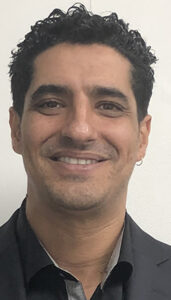By Shahar Masori

SAN DIEGO — After living my whole life in Israel, where I thought of myself as just a person—an Israeli among Israelis, but just a human like everyone else—I was suddenly confronted with a question on the U.S. immigration form that stopped me in my tracks: Race.
Race? What was that supposed to mean? The options were lined up neatly: White, Black, Asian, Native American… I stared at the form, scratching my head, unsure how to answer. I couldn’t make sense of it. Race wasn’t something we really talked about in Israel the way they do here in the U.S. Back home, we were Israelis, and our differences weren’t boiled down to skin color. Sure, there were tensions between ethnic and religious groups, but “race” wasn’t at the forefront of our daily identity.
So, what did I do? I crossed out all the boxes and proudly wrote Homo Sapien. I figured that covered it pretty well. We’re all human, right? I have not heard anything back from the immigration officer in regards to my creative choice, however I did notice a slight chuckle on the officer’s face when I handed in my papers.
That little moment with the immigration form was my first introduction to just how differently Americans and Israelis deal with issues of identity, race, and social justice. It was a bit of a culture shock.
In Israel, the conversations around identity are more tied to religion, ethnicity, and nationality than race per se. The country is a melting pot of Jews from all over the world—Russian Jews, Ethiopian Jews, Yemeni Jews, and everything in between. Add to that a significant Arab minority and a spectrum of religious beliefs within the Jewish community, and you’ve got a society that’s very much engaged in discussions around identity and belonging. But these discussions often revolve around the deeply ingrained political and religious history of the region rather than racial categories.
Now, don’t get me wrong, Israel has its own struggles with social justice and human rights. The tension between Jews and Arabs, the treatment of asylum seekers, and the internal debates about religious versus secular life are ongoing issues. Social justice movements in Israel are constantly pushing for better treatment of marginalized groups, from the LGBTQ+ community to women’s rights advocates. But when it comes to race as Americans understand it, it’s a different story.
Then, I came to the U.S., where race is front and center in conversations about justice, equity, and identity. My first real understanding of race in America was during the Black Lives Matter protests, after the George Floyd tragedy; I quickly realized just how deeply rooted racial issues are here. The history of slavery, segregation, and systemic racism is not just something taught in school; it’s still very much alive in the social fabric of the country.
In Israel, my identity wasn’t so closely scrutinized. I was an Israeli Jew, plain and simple, with all the complexity and layers that come with that. But in America, I felt like I was being asked to fit into predefined racial categories that didn’t reflect who I was or how I saw the world. This country has a long history of categorizing people by race, and it was startling to find that this kind of sorting is still so embedded in the culture.
One of the first things that struck me after moving to San Diego was how divided people seemed to be along racial lines. It wasn’t just in the news or politics—it was in everyday life. Neighborhoods, schools, even social circles were often divided, sometimes subtly, sometimes overtly. It made me wonder: why do we let something as arbitrary as the color of our skin define us so deeply?
Of course, both Israel and the U.S. face their own challenges when it comes to social justice. In Israel, the struggle for peace and equality between Jews and Arabs is deeply complicated, tied to decades (if not centuries) of conflict and history. In the U.S., the struggle is rooted in a different kind of historical trauma, with the legacy of slavery, segregation, and ongoing racial differences shaping the present.
What’s clear to me after living in both countries is that the fight for human rights, against racism, and for social justice is universal. The specifics may differ, but the core remains the same: we’re all trying to create a world where everyone is treated with dignity and respect, no matter where they come from or what they look like.
And maybe, just maybe, if more of us identified as Homo sapiens first, we’d get a little closer to that ideal.
*
Shahar Masori was raised in Hadera, Israel, and immigrated to San Diego in 2000, where he helped build a balloon decor business and raised two sons.